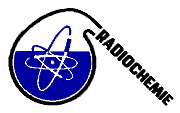Speaker
Dr
Maria Chernysheva
(Lomonosov Moscow State University)
Description
The behavior of biological active compounds in aqueous/oil systems is usually used as a model of their interaction with the lipid membrane of the cells. Thus, study of the processes proceeding in the system of two immiscible liquids is a central question of the research. In this work we propose to use tritium labeled bioactive compounds and scintillation phase method [1] for studying adsorption and partition of the substances in aqueous/oil systems.
Two water-soluble proteins, lysozyme and human serum albumin, were under the test. Tritium label was introduced into the protein molecules by tritium thermal activation technique. The labeling was carried out according to the improved procedure [2] that allowed increasing the specific radioactivity and the yield of labeled compound. Keeping target temperature during the reaction with atomic tritium at 295 K was an innovation. Variation of the W-wire temperature, the gas pressure and the exposition time leads to optimum conditions for tritium introduction into the proteins. Tritium-labeled proteins were purified by dialysis and size exclusion chromatography.
Scintillation phase experiment was conducted for three organic liquids that were used as scintillators, namely p-xylene, octane and octanol. To provide octane and octanol with scintillation properties naphthalene and 2,5-diphenyloxazole were added. The experiment was carried out according the procedure described in Ref. [1].
Partition coefficients and adsorption isotherms of the proteins in aqueous/oil systems were obtained. The profound effect of the organic phase nature on the protein behavior was observed.
The presence of ionic surfactants in the system can influence on protein behavior. Tritium probe is a unique instrument that allowed experimental studying interference of surfactants and proteins in aqueous/oil system. We observed that e.g. lysozyme can be substituted from water/p-xylene interface by both cationic and anionic surfactants and vice versa protein substituted surfactant. But the mechanism of protein-surfactant interaction depends on the charge of protein and surfactant. The reasons for the different results of substitution will be discussed.
This work was supported by RFBR (grant # 09-03-00819).
1. Chernysheva M.G., Tyasto Z.A., Badun G.A., J. Radioanalytical and Nuclear Chem. 2009. V. 280. P. 303–306.
2. Badun G.A., Chernysheva M.G., Proc. VIII Finish-Russian Symp. on Radiochemistry, September 4-5, 2009, Turku, Finland. P.96.
Primary author
Dr
Maria Chernysheva
(Lomonosov Moscow State University)
Co-author
Dr
Gennadii Badun
(Lomonosov Moscow State University)

